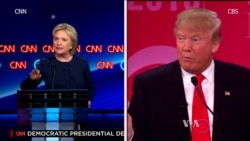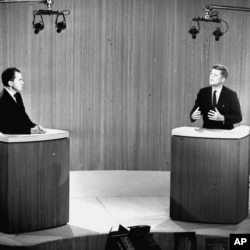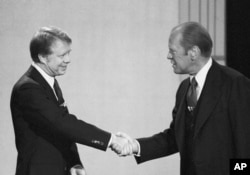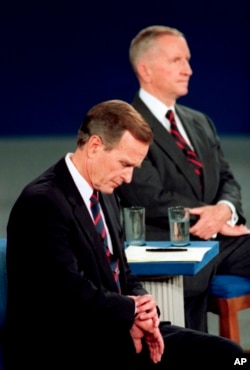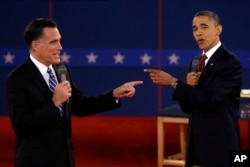The next phase of the 2016 presidential election begins Monday in Hempstead, New York, when Democrat Hillary Clinton and Republican Donald Trump face off in the first of three presidential debates.
In recent weeks, Trump has narrowed the gap with Clinton in public opinion polls, and the debates could be a pivotal moment before voters cast their ballots on November 8.
Televised presidential debates have a rich history, beginning in 1960 with candidates Republican Vice President Richard Nixon and Democratic Senator John Kennedy of Massachusetts.
Kennedy versus Nixon
A youthful, tanned Kennedy took on a haggard, poorly made up Nixon, who was also ill after surgery for a knee injury suffered during the campaign.
Kennedy used the debate to push his message of change after eight years of Republican President Dwight Eisenhower.
“We must give this country leadership and we must get this country moving again,” Kennedy told viewers.
Radio listeners gave Nixon a slight edge in the debate, but those who watched on TV preferred Kennedy, whose polished performance against the more experienced Nixon helped shape the election, which Kennedy narrowly won.
The 1960 debates demonstrated the power of television in politics and helped even the playing field for Kennedy against his better-known opponent.
“It establishes stature. If you can stand toe to toe and be the equal of somebody who is more well-known, that is one thing that happens in debates,” said Jeremy Mayer, associate professor of government at George Mason University in Virginia.
There were no debates in 1964, 1968 or 1972. Neither President Lyndon Johnson in 1964 nor Nixon in 1968 or 1972 wanted to share a national TV stage with their opponents.
Nixon in particular wanted to avoid a repeat of the 1960 event that he believed was at least partly responsible for his loss to Kennedy.
Carter versus Ford
The debates resumed in 1976 and featured the first of what could be considered major gaffes by presidential candidates.
President Gerald Ford faltered against Democratic candidate Jimmy Carter when he was asked about the influence of the Soviet Union on Eastern Europe.
“There is no Soviet domination of Eastern Europe,” Ford said, though he later acknowledged that was not what he meant.
But Carter pounced, saying, “I would like to see Mr. Ford convince the Polish-Americans and the Czech-Americans and the Hungarian-Americans in this country that those countries don’t live under the domination and supervision of the Soviet Union behind the Iron Curtain.”
Ford lost the close race, another example in which the debates mattered, said Stephen Wayne, a Georgetown University professor of government.
“Presidential debates are important in presidential elections when the candidates are very close. Most of the people who watch the debates root for their side or for their candidate,” Wayne said.
Reagan versus Carter
Four years later, the tables were turned on Carter.
He faced Republican Ronald Reagan in a single debate and challenged Reagan for opposing a plan to expand national health insurance.
“Governor Reagan again, typically, is against such a proposal,” Carter said, bringing the memorable retort from Reagan: “There you go again.”
Reagan’s question to voters at the end of the debate with Carter has also become a standard for presidential candidates, especially challengers: “Are you better off than you were four years ago?"
Carter was leading Reagan in the polls before the debate. But Reagan easily won the 1980 election after his reassuring debate performance.
The Commission on Presidential Debates was formed in 1987 to ensure that debates are a permanent part of the campaigns every four years.
The commission has organized the debates every election cycle beginning in 1988 and is doing so again this year with three presidential debates and one debate between vice presidential candidates Senator Tim Kaine, a Democrat from Virginia, and Indiana Governor Mike Pence, a Republican.
Debate faux pas
Recently, candidates have been more concerned with avoiding mistakes that could haunt them on Election Day. That has led the media to focus on some non-verbal moments, such as when President George H.W. Bush checked his watch in his debate with Democrat Bill Clinton and Independent candidate Ross Perot in 1992.
Some interpreted Bush’s glance as a sign he was bored. Clinton went on to win in November.
In the 2000, Democrat Al Gore sighed during his debate with Republican George W. Bush.
The replay of potentially embarrassing moments is what puts candidates on guard, said Mayer of George Mason University.
“Debates seem to be getting a little less powerful,” he said. “People aren’t watching them as much as they used to. Now that may be ameliorated by the fact that while people aren’t watching them live, if you make a mistake, everybody watches a clip of it on Facebook or on YouTube.”
Four years ago, Democrats began to worry after Mitt Romney, the Republican presidential nominee, turned in a strong performance in his first debate with President Barack Obama. But Romney’s surge in the polls proved to be short-lived after Obama recovered in the next two debates.
In this year’s campaign, both Trump and Clinton have turned in strong performances in their primary debates. Trump skewered his primary opponents like former Florida Governor Jeb Bush and Florida Senator Marco Rubio.
Election analysts expect the first Clinton-Trump debate to be the most-watched event of the campaign so far, with enormous political stakes for both contenders.




